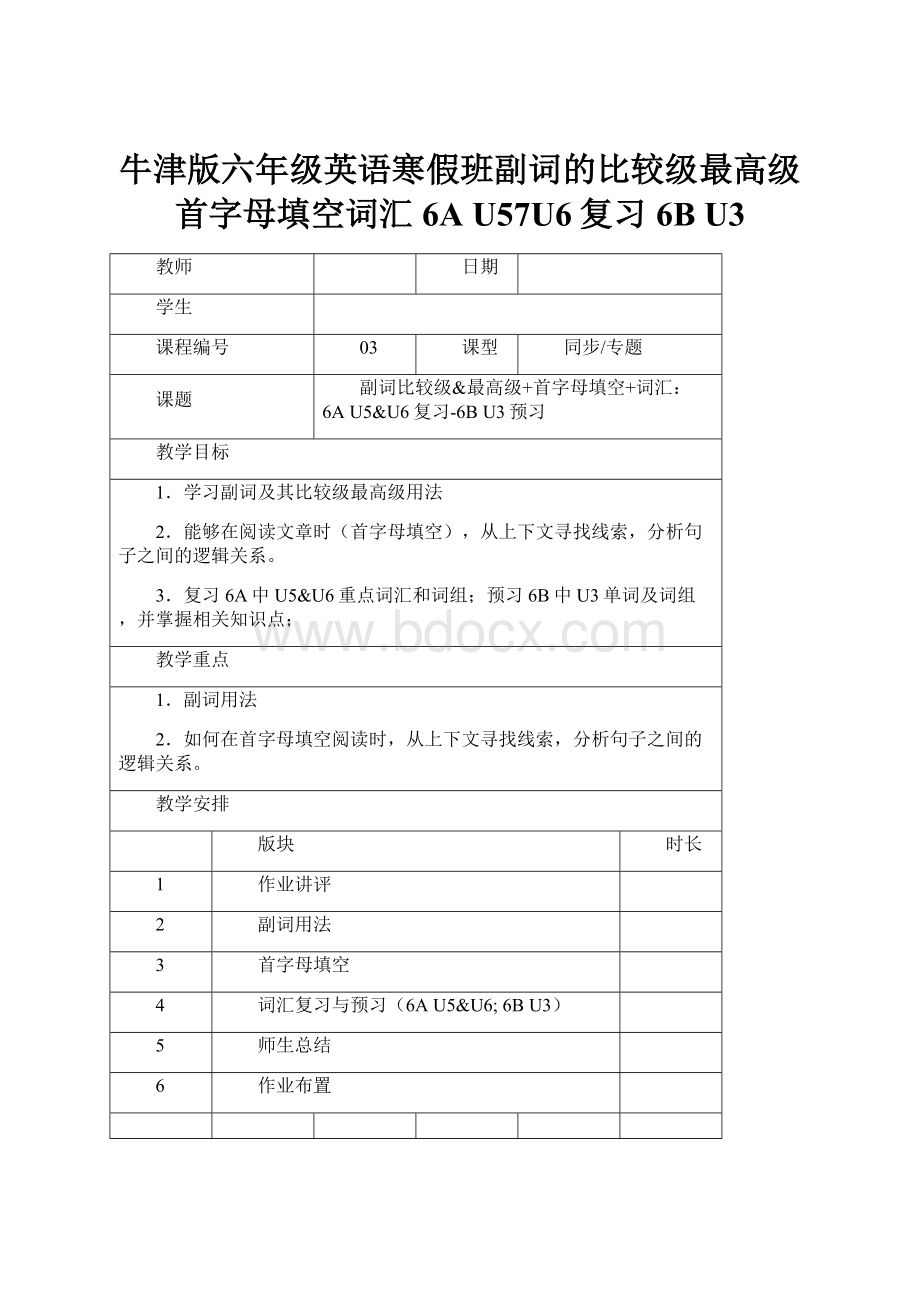牛津版六年级英语寒假班副词的比较级最高级首字母填空词汇6A U57U6复习6B U3.docx
《牛津版六年级英语寒假班副词的比较级最高级首字母填空词汇6A U57U6复习6B U3.docx》由会员分享,可在线阅读,更多相关《牛津版六年级英语寒假班副词的比较级最高级首字母填空词汇6A U57U6复习6B U3.docx(19页珍藏版)》请在冰豆网上搜索。

牛津版六年级英语寒假班副词的比较级最高级首字母填空词汇6AU57U6复习6BU3
教师
日期
学生
课程编号
03
课型
同步/专题
课题
副词比较级&最高级+首字母填空+词汇:
6AU5&U6复习-6BU3预习
教学目标
1.学习副词及其比较级最高级用法
2.能够在阅读文章时(首字母填空),从上下文寻找线索,分析句子之间的逻辑关系。
3.复习6A中U5&U6重点词汇和词组;预习6B中U3单词及词组,并掌握相关知识点;
教学重点
1.副词用法
2.如何在首字母填空阅读时,从上下文寻找线索,分析句子之间的逻辑关系。
教学安排
版块
时长
1
作业讲评
2
副词用法
3
首字母填空
4
词汇复习与预习(6AU5&U6;6BU3)
5
师生总结
6
作业布置
一、副词用法
1.什么是副词?
副词用来修饰动词、形容词、其他副词或整个句子。
它表示行为状况或性质特征,如时间、地点、方式、程度、范围等。
2.副词的构成
(1)本身就是副词,例如:
now(现在),there(那里),always(总是)。
(2)形容词变副词,则在词尾加ly,以y结尾的形容词,变y为i加ly。
例如:
happy(愉快的)→happily(愉快地)
loud(响亮的)→loudly(响亮地)
(3)与形容词同形。
例如:
earlyadj.早的adj.早地
fastadj.快的adv.快地
hardadj.坚硬的adv.坚硬地
earlyadj.早的adv.早地
3.副词的种类
(1)时间副词:
today,tomorrow,now,soon等表示时间,用来回答when这样的问题。
例如:
Iwillseeyoutomorrow.
Ishallbebacksoon.
(2)表频率的副词always/usually/often/sometimes
often,always,usually,sometimes是表示频率的副词。
它们表示经常性动作或情况,不是某一具体动作,常用于一般现在时。
频率副词在句子中的位置比较灵活,可以用于句首、句中和句末。
在句中的位置一般在系动词be之后,或行为动词之前。
这些频率副词在表示动作发生的频率时,程度上有所不同,可这样表示:
always>usually>often>sometimes。
1.always意为“总是,一直”。
这是频率最大的词,表示动作重复,状态继续,中间没有间断。
如:
Nancyisalwayslateforschool.南希总是上学迟到。
2.usually意为“通常”,表示习惯动作,频率仅次于always。
表示除个别情况外,基本上没有变化。
如:
Heusuallygetsupat6o'clock.他通常6点钟起床。
3.often意为“时常,经常”,表示动作重复,中间有间断,表示发生的频率比usually要小,但比sometimes要大。
如:
Ioftengotoschoolbybike,butsometimesIgotoschoolbybus.我经常骑自行车上学,但有时乘公共汽车去。
4.sometimes意为“有时”,表示发生的频率最小。
书写时要十分小心,若分开写成、sometimes就成了“好几次,数次”的意思。
如:
Sometimeshehaslunchinthefactory.他有时在工厂吃午饭。
在句中的位置:
一般放在系动词、情态动词、第一个助动词之后,行为动词前。
补充:
其他常见的频率副词often,seldom,never,hardly.
时态及数的变化:
一般可将always,usually,sometimes,often视为一般现在时的标志,若是第三人称行为动词则要有数的变化。
E.g.Healwaysgetsagiftonbirthday.表示习惯性经常发生的事。
always/usually/often/sometimes
I
Sun
Mon
Tue
Wed
Thu
Fri
Sat
watchtelevision
domyhomework
√
√
√
√
√
√
√
wearschooluniforms
√
√
√
√
√
sashthedishes
√
√
1.I____________watchtelevisionatschool.
2.
I____________domyhomeworkfirst.
3.I____________wearschooluniforms.
4.I___________washthedisheswithhermother.
(2)表顺序的副词first,next,then,afterthat,finally
First,useathickpieceofbreadasthebase.Putsometomatosauceonit.
Secondly,putacherryinthemiddle.
Next,putasliceofsausageontherightofthecherry,andanothersliceofsausageontheleft.
Thenputasliceofgreenpepperaboveeachsliceofsausage.
Afterthat,putasliceoftomatobelowthecherryandsomeslicesofhamonbothsidesofthebread.
Finally,putthepizzainahotovenandbakeitfor5minutes.
(3)疑问副词:
when,where,why,how等
where
对地点提问
Theboyisintheclassroom.
Whereistheboy?
when
对时间提问
Igetupatsixeverymorning.
Whendoyougetup?
why
对原因提问
IamlatebecauseIgotuplate.
Whyareyoulate?
how
问方式
Igotoschoolbybus.
Howdoyougotoschool?
howoften
问频率
Igototheparkonceamonth.
Howoftendoyougotothepark?
howsoon
多久以后,提问“in+一段时间”
HowsoonwillyouleaveShanghai?
Intwoweeks.
howmany
问数量
Theyhavefivepeaches.
Howmanypeachesdotheyhave?
howmuch
问价格
Thepencilistreeyuan.
Howmuchisthepencil?
howlong
多久(提问时间长短)
Ittakesmefifteenminutestogetthere.
Howlongdoesittakeyoutogetthere?
howtall/deep
多高/深
Howtallisthetree?
1.其它副词
表示方式的副词:
slowly,quickly,clearly,early
表示地点的副词:
ahead,back,down,up,here,there,out
表示程度的副词:
enough,quite
表示连续的副词:
so(如此),then(那么),yet(到现在),too(也)
4.副词常见用法
(1)修饰动词:
Myfatheralwaysdrivescarefully.
(2)修饰形容词:
Theboyisoldenoughtogotoschool.
Themanisseriouslyhurt.
(3)修饰其它副词:
Igotupearlyenoughtocatchtheearlybus.
(4)修饰全句:
Luckily,wewonthefootballmatch.
I.写出下列形容词的副词形式。
1.careful__________2.fierce__________3.gentle__________
4.happy__________5.immediate__________6.real__________
7.possible__________8.quick__________9.slow__________
10.sudden__________11.tight__________12.helpful__________
13.loud__________14.lucky__________15.early__________
16.busy__________17.usual__________18.noisy__________
II.选择适当的单词填空。
1.Don’tworry.Youcandoit__________.(well,good)
2.Itisraining__________.(hard,heavy)
3.Theyarerunning__________.(fast,quick)
4.WhereisLinda?
Sheis__________.(out,up)
5.Hestudiesas__________ashisbrother.(hard,hardly)
6.Hewritesas__________asMary.(carefully,careful)
7.Shesometimesgoestoschool__________thanMike.(moreearly,earlier)
8.Hedoeshiswork(the)__________.(careful,mostcarefully)
9.Marystudies__________thanLinda.(hardly,harder)
10.__________itishispen.(Perhaps,Maybe)
III.用括号内副词的适当形式填空。
1.Amongallthesubjectshelikemaths__________(well).
2.Sheplaysthepiano__________(beautifully)thanI.
3.Lucygetsup__________(early)thanTom,butmymothergetsup__________(early)ofusall.
4.Whichcolourdoyoulike__________(well),red,greenorblue?
5.Sheiscareful,shealwaysdoesherhomeworkvery__________(careful).
6.WegetTom’sletter__________(soon)thanwehope.
7.Look!
Frankisrunning__________(fast)and__________(fast).I’msurehewillbethefirsttogetthere.
8.Pleasetellthedrivertogo__________(slow).
9.Tomdraws__________(badly)thanhisbrother.
10.Heplaysfootball__________(well)thanI.
IV.单项选择。
(考查形容词副词用法及其比较级最高级用法)
1.Theroadnearmyhomehasbeenrebuilt.It’smuch______andnoisier.(★)
A.wideB.widerC.widestD.thewidest
2.Manypeoplethinkthe29thOlympicGamesinBeijingwasoneof_______gamesinhistory.(★)
A.morewonderfulB.mostwonderful
C.themostwonderfulD.themostwonderfully
3.JanecanspeakEnglish______.(★)
A.goodB.niceC.sweetD.well
4.Whosings______,RoseorKate?
(★)
A.wellB.goodC.betterD.best
5.Shewrites______thanI.(★)
A.morecarefulB.muchcarefulC.muchmorecarefullyD.muchcarefully
6.--“DoesWuGangeverguess(猜)themeaningsofEnglishwords?
”(★★)
--“He______guessesthemeaningofnewwords.Heuseshisdictionaryallthetime.”
A.usuallyB.neverC.alwaysD.sometimes
7.He______toschooltocleanhisclassroom.(★★)
A.alwayscomesearlyB.comesalwaysearlyC.alwaysearlycomesD.comealwaysearly
8.Kathyusuallythinks______beforeshespeaksatmeetings.(★★)
A.carefulB.carelessC.carefullyD.carelessly
9.“Wemustkeepquite______inthelibrary,”thewomansaid______tome.(★★)
A.quiet;quietlyB.quietly;quietlyC.quietly;quietD.quiet;quiet
10.Thesingerlooked______andshesang______.(★★)
A.beautiful…beautifulB.beautiful…beautifully
C.beautifully…beautifulD.beautifully…beautifully
11.Isthere______intoday'seveningnews?
(★★)
A.importantsomethingB.importantanything
C.somethingimportantD.anythingimportant
12.______willAmycomebackfromtheUnitedStatesofAmerica?
(★★)
--Inaboutaweek.
A.HowfarB.HowfastC.HowsoonD.Howoften
13.My______sisterwhoworksinthebankistwoyears______thanI.(★★)
A.younger,olderB.older,elderC.elder,elderD.elder,older
14.______isitfromHangzhoutoShanghai?
(★)
A.HowlongB.HowfarC.HowD.Howoften
15.Theredbusgoes______thebluecar,soJackwillgotoworkinthebluecar.(★★)
A.muchslowlythanB.soslowlyas
C.evenmoreslowlythanD.muchmoreslowlier
I.Choosethebestanswer.(选择最恰当的答案)
1.Thenightwasvery______,sohehadtotakeoffhisshoes______.(★)
A.quiet;quietlyB.quiet;quietC.quite;quiteD.quite;quietly
2.--______isitfromourschooltotheExposite?
(★)
--Justhalfanhour’sridefromourschool.
A.HowlongB.HowmuchC.HowfarD.Howoften
3.TherearemanygreatchangesinShanghai.WehopeShanghaiwillbeeven______tomorrow.(★)
A.goodB.betterC.bestD.thebest
4.Thefoodtastes______.Takeitaway,please.(★)
A.niceB.wellC.badD.badly
5.Pleasedrive______.You’remakingmenervous.(★)
A.slowB.slowerC.slowlyD.theslowest
6.Thegirllookedatus______.(★★)
A.lovelyB.livelyC.happilyD.friendly
7.Stevenfinishedthesciencetest______inourclassyesterday.(★)
A.quicklyB.morequicklyC.quickliestD.mostquickly
8.Manyaccidents(事故)happenbecausethedriversdon’tdrive______enough.(★)
A.careB.caresC.carefulD.carefully
9.Alicecansing______.Wearesoproudofher.(★★)
A.beautifullyB.happilyC.carefullyD.lovely
10.How______thegirlsareplaying!
(★★)
A.happyB.happierC.happilyD.happiliest
11.Mysonthoughtthatfilmsshouldbefullofactiontokeeppeople______.(★★)
A.interestedB.interestingC.interestD.interests
12.Passmyglasstome,Jack.Ican______readthewordsinthenewspaper.(★★)
A.hardlyB.clearlyC.reallyD.nearly
13.It’s______outside,Icanwearadress!
(★★)
A.warmenoughB.enoughwarmC.coldenoughD.enoughcold
14.______doesittakeyoutofinishyourhomework?
(★★)
A.HowlongB.HowfarC.HowD.Howoften
15.Thegirlinredlooksas______asthepopsinger.(★★)
A.beautifullyB.nicelyC.lovelyD.sweetly
16.JanespeaksEnglish______Joe.(★★)
A.sofluentlyasB.asfluentas
C.morefluentthanD.muchmorefluentlythan
Ø词义判断是要建立在对文章意思的理解基础之上,在语境之下做出正确的判断。
应对的方法是:
文章通读,首句细读,生词暂不纠结,把握文章大意。
它的关键在于“上下文照应”。
Ø词义判断的类型有:
①语言知识型:
考查结合语境,单词的基本用法、习惯用法、常用搭配、特定意义,句型、句式等。
例题解析
MostpeoplebuylotsofpresentsjustbeforeChristmas.B___1___somepeoplethinkwebuytoomuch.Theyhavestartedaspec